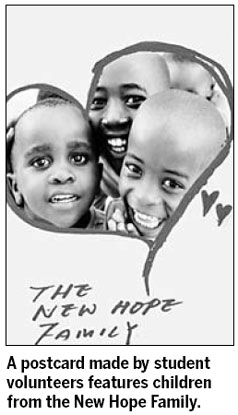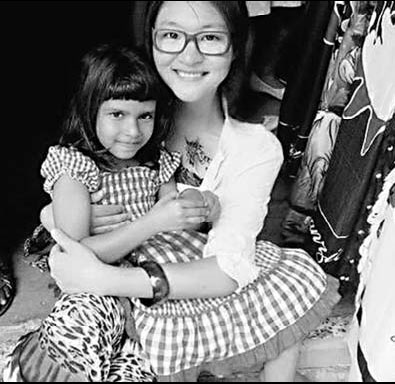She left her heart behind in Tanzania
Updated: 2013-01-08 07:56
By Zhang Xiaomin in Dalian (China Daily)
|
||||||||
|
Cao Jingyi with a child at the New Hope Family orphanage in Dar es Salaam, Tanzania. Photos provided to China Daily |
At the beginning of 2012, a volunteer project transported Cao Jingyi from China to Tanzania, where she made friends with dozens of orphans.
The experience touched her so much that when she returned home, the senior Dalian Maritime University student raised about 13,000 yuan ($2,100) to improve the children's living conditions.
"The kids made my trip to Tanzania more meaningful and unforgettable," she says of the New Hope Family orphanage in the country's capital Dar es Salaam.
Cao and another 11 Chinese students went to the African city with AIESEC, or the Association Internationale des Etudiants en Sciences Economiques et Commerciales, one of the world's largest student-run organizations. There were also student participants from other countries.
They spent six weeks publicizing information about HIV/AIDS prevention in the city.
On weekends, they volunteered at the orphanage, which is about 10 minutes from where they stayed.
The building is a dilapidated gray bungalow with a yard. There is also a small piece of land to grow vegetables and flowers. Inside, there is only one table, two chairs, 20 bunk beds and one old TV set. A small room was turned into the classroom - with only a blackboard and without desks or chairs.
The orphanage's dreariness is in sharp contrast to the bright smiles of its occupants - more than 40 children, age 8 to 16.
"They were always happy," Cao says.
"Whenever they saw us arrive at the orphanage, they ran to grab our hands and hug us. They were always ready to pose for pictures."
The volunteers played games with the children, who performed African songs and dances for their newfound friends.
Cao says the Chinese students were motivated by a Dutch student, who raised money to build a henhouse so the children can raise hens and sell eggs to make a living.
"After finding out about what the Dutch student did, we brainstormed about what we could do for the children," Cao says.

They decided to help the orphanage acquire legal status and improve the children's living conditions.
When they came back to China, Cao and volunteers Hu Xinyi from Nanjing Audit University, Sun Dongchu from Henan University and several others, made postcards with the photos they took in Tanzania to sell to raise money.
Each set, sold at 4 yuan, contained 15 cards with pictures of the beautiful scenery of Tanzania and the children from the New Hope Family.
They sold the cards online and on their campuses. Within four months, they raised about 13,000 yuan.
In July 2012, Lin Lijia from China Agricultural University took the money to Tanzania. Lin and other AIESEC volunteers from China helped the orphanage register with local authorities as an NGO, so it can legally operate.
They repainted the walls, repaired the doors and windows, and rebuilt the washroom, bathroom and kitchen. They also bought new bed sheets, mosquito nets and stationery.
They even managed to hire two teachers for the children and found a middle school that agreed to give free education to five children from the orphanage.
The project to help orphans in Tanzania, initiated by Cao Jingyi, has become an independent AIESEC project, Lin says.
AIESEC China has since also adopted two other orphanages in Dar es Salaam and is committed to work there every summer and winter vacation.
Tang Wanyi, director of an outgoing exchange department, says AIESEC China encourages students to initiate their own projects.
"The students put forward their ideas, and we help them come true," she says.
According to Tang, AIESEC China sent nearly 3,000 students abroad for internship and volunteer programs in 2012.
"Such projects help the students know the world and understand cultural diversity," she says.
"It also gets them started on community work."
Cao says she learned to help those in need. And her time there changed her perspective on happiness.
"I thought happiness meant having your own house, car, job and family," she explains.
"But the children at the New Hope Family changed that. They are happy with small things like a candy, a pencil or an eraser."
Cao says she and her friends will continue to support Dar es Salaam's orphans.
Ren Jinxia contributed to this story.
zhangxiaomin@chinadaily.com.cn
(China Daily 01/08/2013 page20)

 In Photos: 7.0-magnitude quake hits Sichuan
In Photos: 7.0-magnitude quake hits Sichuan
 Li Na on Time cover, makes influential 100 list
Li Na on Time cover, makes influential 100 list
 FBI releases photos of 2 Boston bombings suspects
FBI releases photos of 2 Boston bombings suspects
 World's wackiest hairstyles
World's wackiest hairstyles
 Sandstorms strike Northwest China
Sandstorms strike Northwest China
 Never-seen photos of Madonna on display
Never-seen photos of Madonna on display
 H7N9 outbreak linked to waterfowl migration
H7N9 outbreak linked to waterfowl migration
 Dozens feared dead in Texas plant blast
Dozens feared dead in Texas plant blast
Most Viewed
Editor's Picks

|

|

|

|

|

|
Today's Top News
Live report: 7.0-magnitude quake hits Sichuan, heavy casualties feared
Boston suspect cornered on boat
Cross-talk artist helps to spread the word
'Green' awareness levels drop in Beijing
Palace Museum spruces up
First couple on Time's list of most influential
H7N9 flu transmission studied
Trading channels 'need to broaden'
US Weekly

|

|








